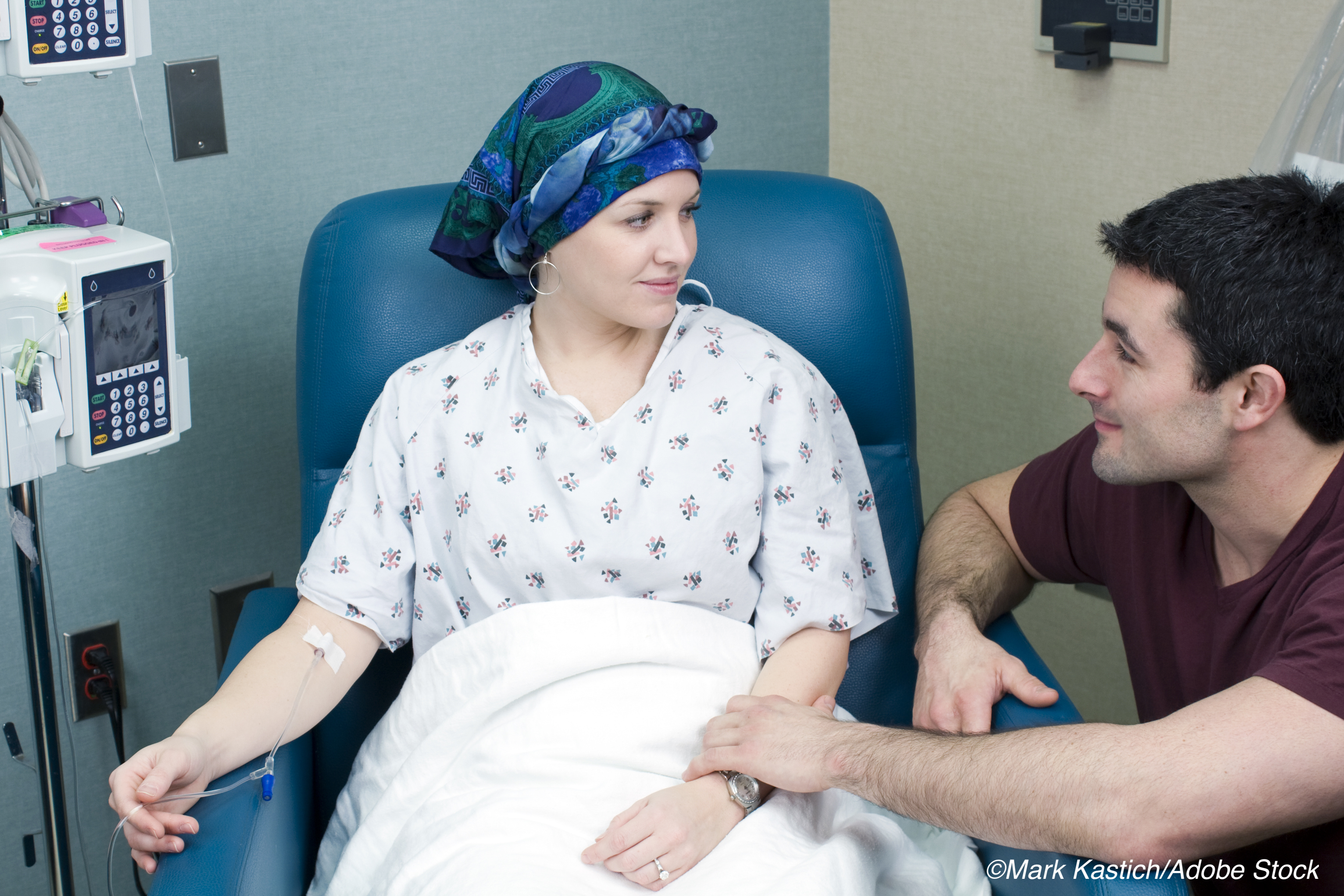
The phase III, randomized SOPHIA trial, which pitted margetuximab plus chemotherapy against trastuzumab plus chemotherapy for metastatic breast cancer, found a progression free survival (PFS) benefit with no significant toxicity for the immune-enhancing monoclonal antibody.
“Margetuximab plus chemotherapy led to an independently assessed PFS benefit versus trastuzumab plus chemotherapy, with a 24% relative risk reduction,” Hope S. Rugo, MD, from the University of California San Francisco Helen Diller Family Comprehensive Cancer Center, and colleagues wrote in JAMA Oncology. “Investigator- assessed PFS complemented primary blinded PFS with a 29% relative risk reduction.”
The FDA approved margetuximab on Dec. 16, 2020 for “the treatment of adult patients with metastatic HER2-positive breast cancer who have received two or more prior anti-HER2 regimens, at least one of which was for metastatic disease.”
The researchers noted that overall survival cannot be assessed at this time “based on the 2 OS interim analyses conducted after 40% and 70% of target OS events (immature data); final analysis of the effect of margetuximab versus trastuzumab on survival will occur after 385 deaths (anticipated in 2021).”
BreakingMED previously reported an earlier analysis from the American Society of Clinical Oncology (ASCO) in 2019. At that time, Carlos H. Barrrios, MD, of the Latin American Cooperative Oncology Group, questioned whether the one month PFS was clinically relevant.
Barrios, who served as discussant during the ASCO presentation noted that a limitation of the trial was its open-label design, but did laud the trial’s use of a third-line regimen as a comparator.
The SOPHIA trial enrolled 536 patients from Aug. 26, 2015 to Oct. 10, 2018 from 166 sites in 17 countries. “Eligible patients had disease progression on 2 or more prior anti-ERBB2 therapies and 1 to 3 lines of therapy for metastatic disease,” the study authors explained. Data were analyzed over 9 months from February 2019 to October 2019.
As the authors note, “ERRB2 (formerly HER2)–positive advanced breast cancer (ABC) remains typically incurable with optimal treatment undefined in later lines of therapy. The chimeric antibody margetuximab shares ERBB2 specificity with trastuzumab but incorporates an engineered Fc region to increase immune activation.”
Prior to randomization the investigators chose chemotherapy, either capecitabine, eribulin, gemcitabine, or vinorelbine. The patients were then randomized 1:1 to either margetuximab, 15 mg/kg, or trastuzumab, 6 mg/kg (loading dose, 8 mg/kg), each in 3-week cycles. For the margetuximab arm “premedication was recommended, if not already given with chemotherapy: standard doses of acetaminophen or ibuprofen, diphenhydramine, ranitidine, and dexamethasone or equivalents,” the study authors noted. The patients were also stratified according to metastatic sites (2, >2), lines of therapy (2, >2) and chemotherapy choice.
Of note: “Investigator-selected chemotherapy choices were vinorelbine (n = 191, 35.6%), capecitabine (n = 143,26.7%), eribulin (n = 136, 25.4%), and gemcitabine (n = 66, 12.3%),” Rugo and colleagues wrote. “Patients received a median of 6 cycles of margetuximab versus 5 cycles of trastuzumab.”
PFS and OS were the primary endpoints, with secondary endpoints of “investigator-assessed PFS and objective response rate by central blinded analysis,” the study authors explained.
There were 266 patients in the margetuximab arm and 270 patients in the trastuzumab arm. The median age of the patients was 56; 100% of patients in the margetuximab arm were women versus 98.9% in the trastuzumab arm. The study authors noted that the groups were balanced.
“All but 1 patient had received prior pertuzumab,and 489 (91.2%) had received prior ado-trastuzumab emtansine,” they reported.
As stated above there was a 24% relative risk reduction in PFS among margetuximab-treated patients versus trastuzumab “(hazard ratio [HR], 0.76; 95% CI, 0.59-0.98; P = .03; median, 5.8 [95% CI, 5.5-7.0] months versus 4.9 [95%CI,4.2-5.6],Oct. 10, 2018) and investigator-assessed PFS showed 29% relative risk reduction favoring margetuximab (HR, 0.71; 95% CI, 0.58-0.86; P < .001; median, 5.7 versus 4.4 months; Sept. 10, 2019).”
In looking at median OS at the second planned interim analysis margetuximab showed a survival advantage over trastuzumab of 21.6 months versus 19.8 months respectively (HR, 0.89; 95% CI, 0.69-1.13; P = .33; Sept. 10, 2019).
In the safety analysis, which was done 6 months after the primary PFS analysis ≥20% of patients in both groups had AEs including fatigue, nausea, diarrhea, and neutropenia, regardless of cause, “as well as vomiting (margetuximab group) and anemia (trastuzumab group).”
The study authors also noted that “grade 3 or greater AEs in at least 5%of patients included neutropenia and anemia in both groups, as well as fatigue in the margetuximab group and febrile neutropenia in the trastuzumab group. Discontinuations owing to AEs were similar (margetuximab, 8 of 266 [3.0%]; trastuzumab, 7 of 270 [2.6%]. Adverse events leading to death were reported in 5 patients (margetuximab, n = 3 [1.1%]; trastuzumab, n = 2 [0.8%], none were considered treatment related.
Infusion-related reactions were higher in the margetuximab group than in the transtuximab — 35 (13.3%) versus 9 (3.4% respectively, mostly in the first cycle. Overall, safety was comparable between the two study arms.
Along with its open-label design, Rugo and colleagues noted: “Limitations of this trial include that the primary end point did not allocate to the CD16A analysis and that patients with active brain metastases were not included. An ongoing neoadjuvant investigator-sponsored trial is comparing margetuximab versus trastuzumab in patients with the low-affinity CD16A genotype (the MARGetuximab Or Trastuzumab trial, known as MARGOT; NCT04425018). Immune-mediated therapies, such as margetuximab,may be more effective in the earlier disease setting where the immune system is relatively intact.”
-
Be aware that margetuximab plus standard chemotherapy demonstrated a PFS benefit versus trastuzumab/chemo regimen.
-
Note that the margetuximab-chemo combination added a month to PFS.
Candace Hoffmann, Managing Editor, BreakingMED™
Rugo reported receiving grants from MacroGenics during the conduct of the study; and grants from Roche, Pfizer, Novartis, Lilly, Merck, Seattle Genetics, Odonate Therapeutics, Eisai, Sermonix Pharmaceuticals, Immunomedics, and Daiichi Sankyo and personal fees from Puma and Samsung outside the submitted work.
Cat ID: 22
Topic ID: 78,22,730,22,691,192,925


